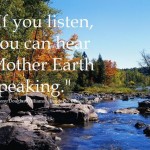At my UU Church this Sunday, we had a planned discussion of what people wanted more/less of in the worship service. We wrote things we liked and things we wanted to change on sticky notes and note cards. Many of the comments, including my own, asked for more spirituality in the worship service. This was phrased in different ways: “More heart, less mind,” wrote one person. I didn’t like how that was phrased, but I think we had the same concern: too much discussion of politics and social action to the exclusion of personal experience and personal transformation. I want more sermons about that
direct experience of that transcending mystery and wonder, affirmed in all cultures, which moves us to a renewal of the spirit and an openness to the forces which create and uphold life (UU Source #1).
After all the comments were read, our congregation president pointed out that there are those in the congregation who come not for spirituality, per se, but for social action, and that people may define the “balance” between these interests differently. This has been an issue in the wider UU community also, and has been expressed in calls for “a language of reverence” by several prominent voices in the UU.
But the real debate this Sunday started when one of the few Christian members suggested that each “group” in the church be assigned a certain number of Sundays, “so that everyone gets they’re say”, including the Pagans, the Buddhists, and so on (and also guarantee that he would, in his words, “get Easter and Christmas back”). He comment that everyone should “have their say” brought me back to a discussion I had last year with Dr. Victoria Weinstein at her blog PeaceBang. I had argued that what UU worship needs is more cultural specificity, not less. I wrote:
“We need not to be afraid of offending some people or even a lot of people. If you’re offended by the Christian service this week, don’t worry, next week we’ll be doing something completely secular, or Buddhist, or Pagan. Stick around and you’ll be bound to be offended on some occasions and inspired on others.”
Dr. Weinstein challenged me on this:
“I believe we must pursue a ministry together that asks more of our members than that. I believe that asking people to be good sports, hold their breath and suffer through the worship styles or elements that they don’t personally resonate with is to perpetuate immaturity and petulance among us. We should make liturgical understanding part of our religious education efforts, in the faith that with understanding comes reconciliation and healing. We must expect each Unitarian Universalist to do the inner work necessary to get beyond their own restless eye-rolling reactions to theologies they don’t personally resonate with, and to tranquil non-attachment.
“There is a connected institutional consideration: by encouraging people to ignore or merely tolerate what they don’t like and to “wait their turn,” liturgically speaking, we pander to the individualistic, consumer mentality that the Church exists to question, challenge and reject. Church is not a product that one chooses and then purchases, and worship is not an event that one attends as a spectator and then reviews as one would a movie or play. We need to preach covenantal theology […]
“In this covenantal framework, people do not merely tolerate the readings, hymns, dances, and rituals that constitute one week’s worship and wait impatiently for their favorite flavor or worship to appear back on the menu, they consider each Sunday a sacred hour of spiritual expression to which they obligated to bring their most generous heart and mind.
The charge of consumerism hit home for me. I think Dr. Weinstein’s comments highlight the difference between a real community (which she defines in covenantal terms) and psuedo-community, where everyone just waits for their turn to talk.
Back in the worship discussion, the suggestion to assign certain Sundays to each “group” was met with general disapproval. One person voiced a fear that, rather than building a true community, we would be encouraging the growth of what he called “a coalition of special interest groups”. Someone else said, “We’re UU’s first.” That last statement is probably not true of everyone. Many people there, I suspect, define themselves first as something else: Buddhist, Pagan, Humanist; and only secondarily as UUs. But I think it is valid to say that, when we are together on Sunday, we should be UU first — that is, if we are to build a true community.
Everyone agreed it was important to honor individual spiritual paths. This is enshrined in the six UU Sources, especially the third:
Wisdom from the world’s religions which inspires us in our ethical and spiritual life.
But someone said that the trick in community building is to honor our differences, without making those differences the focus. How do we do that? The Buddhist in the group responded that, when we come together, we need to answer the question of how our individual spiritual paths relate to what we have in common, namely the Seven Principles which UUs affirm and promote:
- The inherent worth and dignity of every person;
- Justice, equity and compassion in human relations;
- Acceptance of one another and encouragement to spiritual growth in our congregations;
- A free and responsible search for truth and meaning;
- The right of conscience and the use of the democratic process within our congregations and in society at large;
- The goal of world community with peace, liberty, and justice for all;
- Respect for the interdependent web of all existence of which we are a part.
I think that is the key too. Community building is obviously a challenge for people like UUs, who have different spiritual paths and practices. But there is something that binds us together: the Seven Principles and the Six Sources. Uninformed people often say that UUs can believe anything they want, but that’s not true. There are many beliefs that might run afoul of the Seven Principles.
As I reflected on this conversation, it struck me how similar this discussion is to the one playing out in the Pagan blogosphere over the nature of the Pagan community. Pagans are at least as diverse as UUs, and like UUs they are struggling to define their sense of community. After Sunday’s discussion, it seems to me that the real challenge of Pagans is the lack of a unifying set of “first principles”. Say what you will about how vague and general the UU Principles are, they are at least something that we can all agree on — and something we can relate our individual spiritual paths to when we want to communicate with each other. Paganism lacks this. I can’t see that the Pagan “community” will ever be more than a “coalition of special interest groups” without such a statement.
I think the closest Pagans ever came to such a statement in the U.S. was in 1974, with the short-lived Council of American Witches published the “13 Principles of Wiccan Beliefs”. But that only applied to one form of Paganism: Witchcraft. A recent attempt to revive the Council and update the 13 Principles collapsed rather quickly due to issues of lack of transparency. The Covenant of the Goddess, which is perhaps the closest thing the U.S. has to a Pagan umbrella organization, is also Wiccan-centric. It has a code of ethics, and no other requirement of belief/praxis other than “Generally focus theology and ritual, etc., around the worship of the Goddess and the Old Gods (or the Goddess alone)”, but even that is too specific to include most Pagans.
In contrast, in the U.K., the Pagan Federation has published “Three Principles” for its membership which I believe are more inclusive:
1. Love for and kinship with Nature; reverence for the life force and its ever-renewing cycles of life and death.
2. A positive morality, in which the individual is responsible for the discovery and development of their true nature in harmony with the outer world and community. This is often expressed as “Do what you will, as long as it harms none”.
3. Recognition of the Divine, which transcends gender; acknowledging both the female and male aspect of Deity.
It’s an interesting historical fact that the Pagan Federation grew into an umbrella organization in the UK, while its sister organization in the U.S., the Pagan Way, developed in a very different direction — into numerous independent Pagan Way groves with no connection to one another. I wonder if there is something about American culture which gets in the way of American Pagans becoming more than “a coalition of special interest groups”.
Some may take issue with the wording of the Pagan Federation’s Principles. If so, I find Ronald Hutton paraphrase more inclusive:
1. Neopagans accept the inherent divinity of the natural world and reject the notion of a transcendent creator.
2. Neopagans embrace a simple ethic of freedom to satisfy individual needs and desires and pursue personal growth and happiness, while avoiding harm to others. They reject any notion of a divinely prescribed law and concepts of sin or salvation.
3. Neopagans believe that divinity can be both male and female and that women may exercise religious power as effectively as men.
To these, Hutton adds a fourth descriptor:
4. Neopagans also turn for symbolism, kinship, and inspiration to the pre-Christian religions of Europe and the Near East.
(Ronald Hutton, Triumph of the Moon, p. 390). I would just leave off the limitation to Europe and the Near East and say “Neopagans also turn for symbolism, kinship, and inspiration to the pre-Christian religions of the world.“
These four principles do seem to me to be pretty universal to contemporary Pagans. They may not be the first things we would all mention to describe our individual paths, but they are something that we could build a community around, like the UUs do with their Seven Principles. In the same way the UU Seven Principles are not my “first principles” or those of any member in particular, they are still the first principles around which the UU congregation to which I belong can build a community.
Similarly, individual Pagans will have myriad statements of belief, but these four principles are perhaps something that most Pagans can accept and build true community around. There are many “principles” which I would add to my own statement of first principles, including those listed by Michael York as the “essential features of Paganism”:
- corpo-spirituality,
- appreciation of nature (this is captured by principle #1 above),
- this-worldly focus,
- an understanding of enchantment,
- a plurality of the divine,
- a humanistic grounding,
- and the experience of enjoyment.
(Michael York, “Idolatry, Ecology and the Sacred as Tangible”). But many Pagans would probably balk at some of these, so I would just limit it to the four principles above. I would very much like to see something like a “Council of American Pagans” organized to work on something like this. What do you think? Is this possible?















